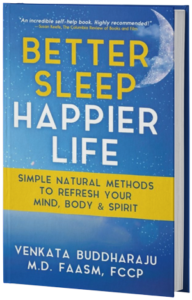#Sleep #Mindfulness #Exercise # Hydration
Venkata Buddharaju MD, FAASM, FCCP
Board Certified Critical Care & Sleep Physician
Author/Speaker/Doctor
www.drbuddha.com
Things that we used to do every day and enjoy are slowly fading away, we cannot find basic supplies, and all events cancelled. No meetings, parties and social events. In some parts of the world, government is even stricter; police are chasing people who are not following the protocols and keeping them away. All of us are in a dilemma, whether to get tested or stay in silence until something happens. Scientists, public health officials and other pundits are trying to figure out what is going on with this novel Corona virus (Covid-19). This is the first time in our life; we are witnessing a global scale shutdown of everything and many are working from home, except few in emergency and other essential services (grocery workers, police, doctors, nurses, other health care workers and few other essential factory workers). Many countries are telling their people to #stay home for some unknown time.
Covid-19 symptoms are similar to other flu like illness you often get during the cold season. Some of the symptoms are fever, runny nose, sore throat, cough, shortness of breath. Majority of the cases are mild and recover, some patients get worse and require hospitalization due to pneumonia and respiratory failure.
We don’t know exactly how many are infected on a global scale even though testing is ramped up. We also don’t know, why some people are infected more than others. We know that emergency and health care workers, due to their close human contact are much higher risk of getting the virus. I believe that our immune system, exposure, close contacts with people who are carrying this Covid-19 virus with or without symptoms play a big role in the transmission and manifestation of the disease. Many physicians and health care personal are at very high risk of getting the infection. Everyone is doing their best and committed to save lives and comfort others who cannot make it. During this war against invisible, many doctors, nurses and other health care workers around the world are infected and some lost lives.
As an ICU physician here in Chicago, I see the life is getting pretty intense. Many of the hospitals, where I work have designated separate floors for suspected Covid patients waiting to be tested and treated. Visitors are not allowed to see any patients’ even critical ones except when they are dying. My wife worries every day about my work. My son, medical student working in New York one of the hard hit cities in USA calls me every day and says be careful.
I believe, as long as we understand the process and follow the protocols from CDC and others, take precautions (hand washing, wearing personal protective equipment, masks, gowns etc), we don’t need to panic but help others, while helping ourselves. I thought of writing these few survival tips to calm down during this crisis. You can practice these at home and let’s hope we can pull through this crisis soon.
#SLEEP AND IMMUNITY
A decade of scientific research has shown that sleep plays a vital role in immune defense. Sleep duration and regular sleep – wake cycles are essential to mount adequate immune response to infections.
We feel sleepy when sick; you probably remember taking few days off, staying home and sleeping longer hours during the flu season. Our parents and grandparents used to advice rest and sleep during sickness to recuperate. Scientific studies have shown that influenza or other infections cause sleepiness due to release of sleep inducing cytokines.
Cytokines are special protein molecules, two most important ones are Interleukin-1 and tumor necrosis factor alpha. These cytokines trigger inflammation (pro- inflammatory) and mount host defense response to viral or other infectious challenge. It appears that slow wave or deep sleep also increases during this time. Sleep deprivation changes to T lymphocytes and natural killer cells and increases the risk of getting flu and other respiratory infections. Sleep deprivation also reduces antibody formation to flu and hepatitis vaccinations. Thus sleep helps immunity to fight against infections. Although we don’t have much information specific to Covid-19 type of corona virus, we assume that sleep will help combat this type of infection too.
#Sleep and #Anxiety
Studies have shown that deep sleep, a stage of non rapid eye movement sleep (NREM) slow wave sleep restores brain connections and has shown to reduce anxiety levels. On the other hand, #sleep deprivation increases the #stress and anxiety levels and makes you more irritable during the day. Deep sleep restores the function in the area of pre frontal brain where our emotions are regulated. Sleeping for an optimal duration (Adult 7-9 hours, Teenagers 14-17 years: 8-10 hours) improves the mood, reduces anxiety and the feelings of depression.
The following practical tips are useful for optimizing sleep
- Regular sleep–wake times: Going to bed at the same time every day is the best way to keep sleep-wake times in sync with your internal clock.
- Limit daytime naps to thirty minutes.
- Avoid caffeine and other stimulants in the evening.
- Eat small meals at least one to two hours before bedtime and avoid high-fat and spicy foods that can increase acid reflux and arousal.
- Exercise in the morning or at least three hours prior to sleep.
- Go to bed when sleepy and don’t spend too much time awake in bed. If not sleepy, go to a different room and engage in a relaxing activity such as reading but don’t expose yourself to too much light.
- Don’t engage in arguments or focus on concerns before bedtime.
- Keep the bedroom cool. Body temperature falls during sleep onset and is lowest in the early morning hours of sleep.
- Reduce or avoid noise in the bedroom.
- Engage in soothing activities such as warm water baths or meditation to relax the mind.
Coping strategies to deal with stress
Mindfulness
Mindfulness is paying attention to the present moment, not thinking past or worries the future. Few types of mindfulness that you can practice are Meditation and focused breathing.
Studies have shown that mindfulness meditation reduces anxiety, stress, helps sleep and other medical conditions such as Hypertension and Fibromyalgia.
Mindfulness practice of living in the present moment reduces anxiety, worry thereby helps sleep. Social isolation, staying home can lead to anxiety which can reduce sleep time. Recent randomized study in Wuhan, china during the current corona pandemic, the study authors looked at how mindfulness buffered the impact of covid -19 and helped to protect sleep duration compared to the people who practiced mind – wandering. They found out, those who practiced mindfulness were able to cope better with the news during the pandemic.
MEDITATION
Meditative practice improves memory and mental calmness and brings homeostasis to the mind and body. Select the place and posture that best suits you—in a chair, on the floor, or in nature. Focus on the breath coming and going from your nostrils. Every time you complete one deep inhalation and exhalation, count one. You can count a total of 10 breaths per session. Don’t judge thoughts that come to mind. Just watch them as a spectator. After a while, your mind will reach a steady state, like calm waters on a lake. You can do this mediation session for 15 minutes twice a day or longer.
EXERCISE
Moderate aerobic exercise helps improve sleep quality and slow wave or deep sleep which plays a key role in keeping our immunity strong and fight the infections in general. Try to do at least 30 or 50 minutes of aerobic exercise while staying at home. While working from home, don’t forget to get out of your chair once in a while and walk and move to improve circulation and prevent blood clots formation.
If you are busy or in between your work hours, you can consider this quick 15 minutes moving and calm down session.
Fifty pushups or equivalent of your choice (seven minutes)
Three yoga steps of your choice with focus on breathing (three minutes)
Twenty-five seconds standing on a single leg and alternating (two minutes)
Finger-hand breath with counts of ten (three minutes)
Total time spent: fifteen minutes.
STAY HYDRATED
A person’s daily water requirement varies depending on his or her exposure to sunlight, type of work he or she does, and how much he or she sweats. Listen to your body when it comes to thirst and drink as needed. During the infection of any kind including corona virus the fluid requirements go up especially when you have fever which causes dehydration. At a minimum, drinking one to two liters of water per day is essential for maintaining homeostasis. If you have a medical condition that restricts fluid intake, consult your physician for advice on what to drink and how much.
You can find out more on how simple #lifestyle changes can bring better sleep , happiness and good health in my first book “# Better Sleep Happier Life”
Dr. Venkata Buddharaju
Author, Speaker, Doctor

